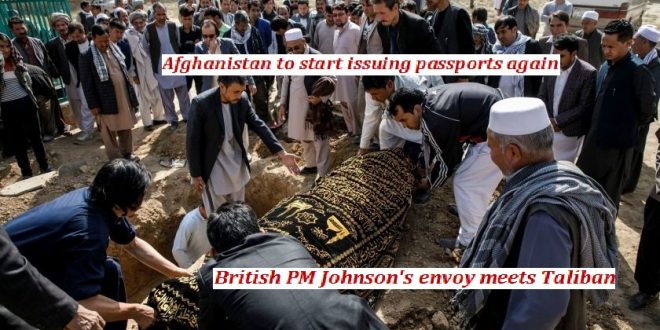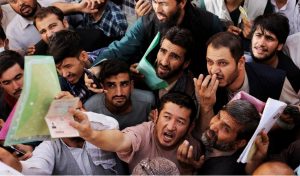06-10-2021
By SJA Jafri + Bureau Report + Agencies
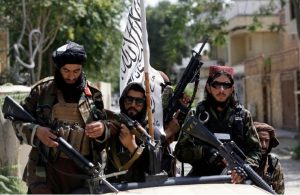 ISLAMABAD/ KABUL/ DAYKUNDI: The Taliban killed 13 more members of the Shia Hazara ethnic group, including a 17-year-old girl, in the central province of Daykundi, shortly after they took power in Afghanistan, according to a new report from Amnesty International.
ISLAMABAD/ KABUL/ DAYKUNDI: The Taliban killed 13 more members of the Shia Hazara ethnic group, including a 17-year-old girl, in the central province of Daykundi, shortly after they took power in Afghanistan, according to a new report from Amnesty International.
On August 30, a convoy of 300 Taliban fighters entered Khidr district and killed at least 11 former members of the Afghan National Security Forces (ANSF), nine of whom were taken to a nearby river basin where they were executed shortly after having surrendered, the rights group said in its report published on Tuesday.
A teenager, identified by the name of Masuma, was killed in crossfire after the Taliban targeted Afghan forces who were attempting to flee the area. Another civilian, Fayaz, a newly-wed in his 20s, was also among those killed in the crossfire.
The ANSF members who were killed ranged in age from 26 to 46, Amnesty said. All the victims were Hazara, who were persecuted during the Taliban’s first stint in power between 1996 and 2001.
It is the second killing of Hazaras documented by Amnesty. At least nine Hazara men were killed by Taliban fighters in Ghazni province in July before the group captured power, Amnesty reported on August 19.
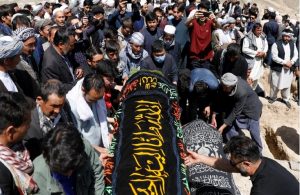 Both the Taliban and their rivals, the Islamic State Khorasan Province, ISKP (ISIS-K), an ISIL affiliate, have been accused of targeting the Hazara people, who make up the majority of Afghanistan’s Shia population.
Both the Taliban and their rivals, the Islamic State Khorasan Province, ISKP (ISIS-K), an ISIL affiliate, have been accused of targeting the Hazara people, who make up the majority of Afghanistan’s Shia population.
By September 1, the Taliban had denied the killings. Saidqullah Abed, the Taliban appointed police chief for Daykundi, would only confirm that one of their fighters had been injured in the crossfire.
Raihana Azad, a former Member of Parliament for the province, also verified Amnesty’s report to Al Jazeera, saying the events of August 30 amounted to “inhumane mass killings” carried out by the Taliban.
She said what transpired in Khidr was in direct violation of the Taliban’s claims of a nationwide general amnesty for former security forces and government workers.
“These cold-blooded executions are further proof that the Taliban are committing the same horrific abuses they were notorious for during their previous rule of Afghanistan,” said Agnes Callamard, Amnesty International’s secretary-general.
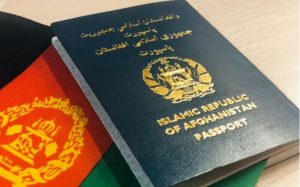 During their five-year rule in the 1990s, the Taliban were accused of massacring hundreds of Hazaras in the provinces of Balkh and Bamiyan.
During their five-year rule in the 1990s, the Taliban were accused of massacring hundreds of Hazaras in the provinces of Balkh and Bamiyan.
Zaman Sultani, South Asia researcher at Amnesty International, said the killings in Daykundi follow a clear pattern by the Taliban.
He points to a statement that interviewees attributed to a senior Taliban official as proof: “I have killed people for the past 20 years. Killing is easy for me, I can kill again,” the official reportedly told Daykundi residents.
Azad, the former MP, said the Taliban’s abuses in Daykundi do not end with the killings.
She says that since the Taliban captured the province on August 14, a day before former President Ashraf Ghani fled the country; thousands of families have been forced from their homes in the Gizab and Pato districts of the mountainous province.
A list compiled by residents’ shows that as many as 20,000 families were forcibly displaced across at least 10 different villages over the last month and a half.
Daykundi residents speaking to Al Jazeera said that when the Taliban came to their homes, the fighters claimed that the families had been illegally occupying the land or that a Taliban shura had decided the land “belongs to the people”.
Azad says the wide swath of lands taken by the Taliban makes their reasoning hard to believe.
“If it was just one village it may be possible that these were some kind of legal issues, but it doesn’t make sense that there are land disputes all across this many villages.”
She says many of the families had been living on their land for generations, “They had the deeds in their hands.”
Mohammad*, a resident of the Gizab district, is one of those people.
The 42-year-old says his wife and children were at home when the Taliban came to their doorstep demanding they vacate the property on September 23. Frightened and unsure of what to do, all nine people in Mohammad’s family left the house they had lived in for decades.
“I was a child when that house was built. I planted the trees outside it myself,” Mohammad said to Al Jazeera from Kabul, where his family now lives.
Before coming to the capital, Mohammad, a former education ministry worker, tried to appeal to the Taliban, but he says it was no use, even though the fighters who came to his house were from the same district as him.
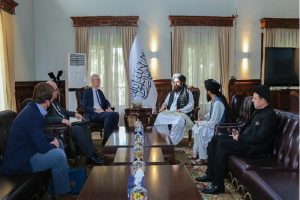 “I tried to explain to the Islamic Emirate, but they just said, ‘It’s been decided that your land now belongs to the people.’”
“I tried to explain to the Islamic Emirate, but they just said, ‘It’s been decided that your land now belongs to the people.’”
Even his deed was of no use. He was told the decision was made in accordance with Islamic law. Like Azad, though, Mohammad has difficulty reconciling the Taliban’s justification, saying that even in a Sharia Court; land disputes can take months, if not years, to settle.
“These things don’t just happen in a matter of weeks,” Mohammad said.
Azad, the former MP, said that with the Afghan winter fast approaching, these forced evictions would lead to a humanitarian crisis in a mountainous province where it can take up to 14 hours to travel from a district to the capital of Nili.
“Without their homes and lands, these people have no financial means to move anywhere else, so they’re just left to live in tents in fields,” Azad said.
Daykundi is considered one of Afghanistan’s poorest and least-developed provinces. Most of the men in the province head off to other cities or Iran and Pakistan as teenagers to work as day labourers or in mines.
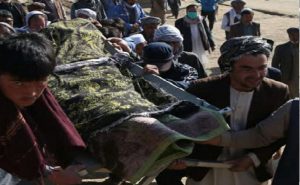 These forced displacements seem to be in line with other reports on the Taliban before their takeover of Afghanistan. In July, Human Rights Watch issued a report from the Northern Province of Kunduz alleging the Taliban forced at least 400 families to flee their homes.
These forced displacements seem to be in line with other reports on the Taliban before their takeover of Afghanistan. In July, Human Rights Watch issued a report from the Northern Province of Kunduz alleging the Taliban forced at least 400 families to flee their homes.
“The forced displacement of civilians is unlawful unless required for the security of the affected civilians or is absolutely necessary for military reasons. Retaliatory attacks are a form of collective punishment and are also prohibited,” Patricia Gossman, associate Asia director at Human Rights Watch, told Al Jazeera.
*Names changed to protect their identities.
Meanwhile, British Prime Minister Boris Johnson’s special envoy met Taliban leaders in Afghanistan to discuss the humanitarian crisis and ways to prevent the country from becoming an incubator for militants.
Simon Gass, Johnson’s high representative for Afghanistan, met Taliban leaders including Amir Khan Muttaqi, Mullah Abdul Ghani Baradar and Abdul Salam Hanafi, the UK Foreign Office said.
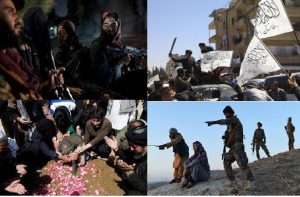 They “discussed how the UK could help Afghanistan to address the humanitarian crisis, the importance of preventing the country from becoming an incubator for terrorism, and the need for continued safe passage for those who want to leave the country,” the Foreign Office added.
They “discussed how the UK could help Afghanistan to address the humanitarian crisis, the importance of preventing the country from becoming an incubator for terrorism, and the need for continued safe passage for those who want to leave the country,” the Foreign Office added.
“They also raised the treatment of minorities and the rights of women and girls.” Gass was accompanied by Chargé d’Affaires of the UK Mission to Afghanistan in Doha.
The Taliban declared a new regime after overrunning the capital in August and ousting the US-backed government but after 20 years of war the aid-reliant country faces economic collapse, with major donors pausing funding and no emergency support in place.
The new rulers have been courting hesitant foreign powers in a bid to restart cash flows to the country, where civil servants and healthcare workers have gone months without salaries.
Taliban officials tweeted pictures of the first meeting between Simon Gass, Britain’s special representative for Afghanistan, and Deputy Prime Ministers Abdul Ghani Baradar and Abdul Salam Hanafi.
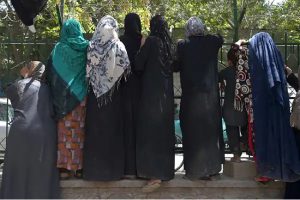 The two sides discussed how Britain can help Afghanistan battle terrorism and a deepening humanitarian crisis — and provide safe passage for those who want to leave the country, a UK government spokesperson said.
The two sides discussed how Britain can help Afghanistan battle terrorism and a deepening humanitarian crisis — and provide safe passage for those who want to leave the country, a UK government spokesperson said.
Abdul Qahar Balkhi, the Taliban’s foreign ministry spokesman, said the meeting “focused on detailed discussions about reviving diplomatic relations between both countries”.
Western governments have warned that the Taliban must form an “inclusive” government and respect women’s rights if they are to be formally recognised.
Neighbouring Pakistan however has been pushing for the international community to engage with the new rulers and help stabilise a country threatened by famine.
The Taliban have made some gestures towards international respectability, while insisting on their right to return to a government based on their interpretation of Islamic law.
On Tuesday girls returned to some secondary schools in a northern province, Taliban officials and teachers said, despite them remaining barred from classrooms in much of the country.
A video posted by the group’s spokesman Suhail Shaheen showed dozens of schoolgirls in black, some wearing white head scarves and others with black face veils, sat in chairs waving Taliban flags but education ministry official Mohammad Abid said there had been no policy change from the interim central government, telling AFP on Tuesday: “High schools still remain closed for girls.”
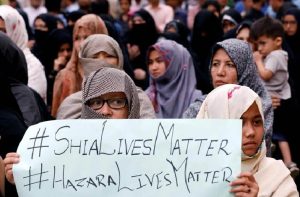 Earlier, following months of delays that hampered attempts by those trying to flee the country after the Taliban seized control in August, Afghanistan will start issuing passports to its citizens again, a senior official said on Tuesday.
Earlier, following months of delays that hampered attempts by those trying to flee the country after the Taliban seized control in August, Afghanistan will start issuing passports to its citizens again, a senior official said on Tuesday.
The process, which had slowed even before the Taliban return to power following the withdrawal of US forces, will provide applicants with documents physically identical to those issued by the previous government, the official said.
Acting head of the passport office Alam Gul Haqqani told reporters in Kabul that between 5,000 and 6,000 passports were to be issued each day, with women being employed to process those meant for female citizens.
Interior ministry spokesman Qari Sayeed Khosti told the briefing that 25,000 applicants had reached the final stage of payment for their passports, with roughly 100,000 applications in the earlier stages of the process pending.
It is pertinent to mention here that the Taliban had entered Kabul on October 15 and President Ashraf Ghani left Afghanistan saying he wanted to avoid bloodshed, bringing the insurgents close to taking over the country two decades after they were overthrown by a US-led invasion.
 Pressmediaofindia
Pressmediaofindia
